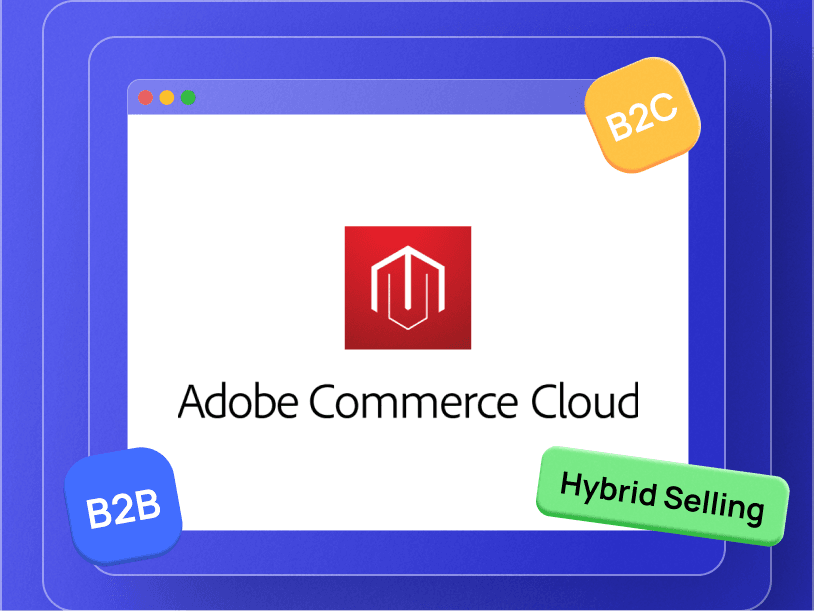Magento vs Shopify - What's Best for Your Ecommerce Store?
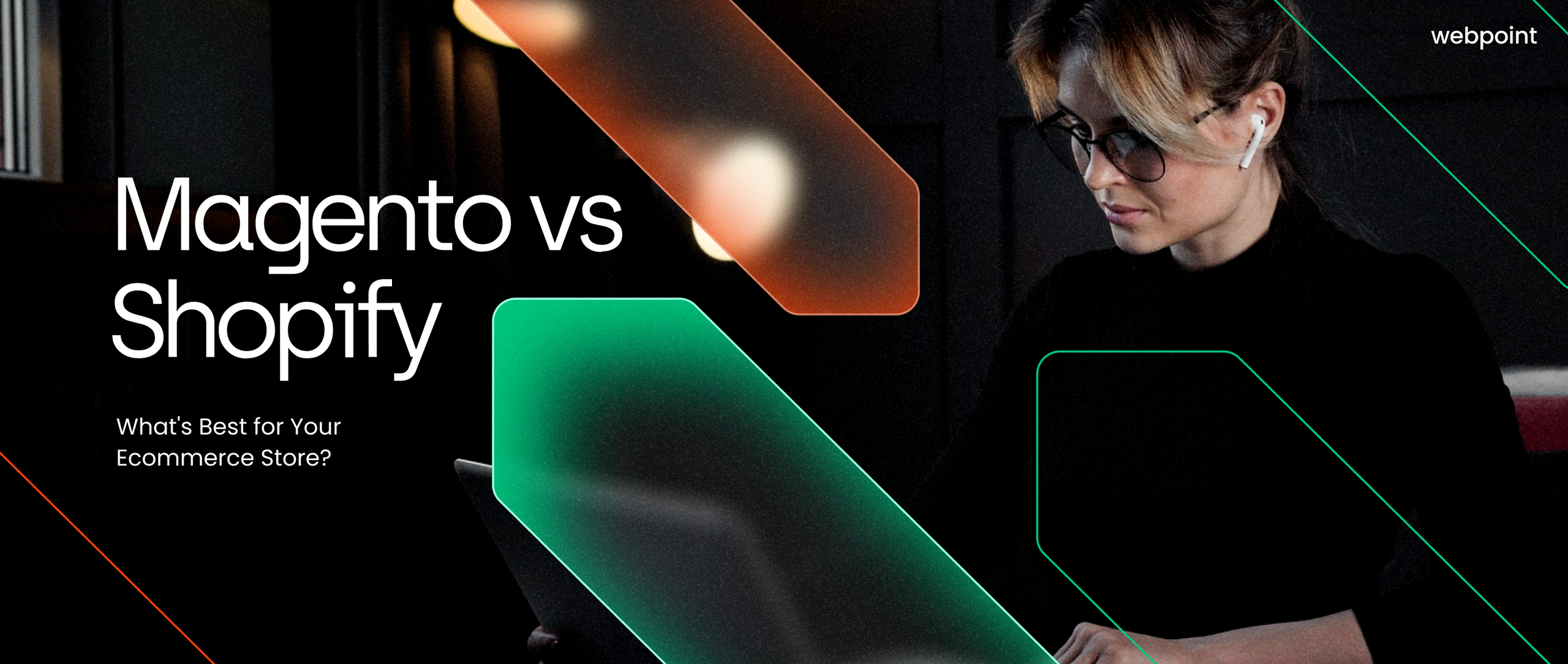
Is Shopify Plus or Magento (Magento Commerce) the right one for your online store?
Find out which platform suits your ecommerce needs with this detailed comparison of Magento vs Shopify.
Like you, many businesses grapple with this decision, facing many challenges and questions.
Why?
Because the platform you select today sets the path for your future. So before making the final decision, you must understand:
Product range, payment, and
Delivery options.
This article will reveal all the pros and cons of using Magento vs Shopify Plus. Let's jump right in!
The Total Cost of Ownership: Magento vs Shopify
In this comprehensive comparison, we will examine the pricing structures of Magento and Shopify Plus. Pricing plays a significant role in choosing the right platform for your e-commerce store.
While we've broken down the pricing components, it's essential to consider the total cost of ownership (TCO). Magento Commerce often incurs a higher TCO than Shopify Plus due to its higher development costs. However, it's worth noting that Shopify Plus agency partners may charge higher hourly rates.
Both platforms offer hosted versions with maintenance and security handled in the cloud. They have extension marketplaces for added functionality. You should consult with your agency partner for extensive back-end integration to understand the potential additional costs.
The choice between Shopify Plus and Magento Commerce depends on your business needs and budget. While Shopify Plus offers a lower starting point, Magento Commerce provides more customization and scalability at a higher cost. Carefully assess your requirements and long-term goals to make the best decision for your eCommerce venture.
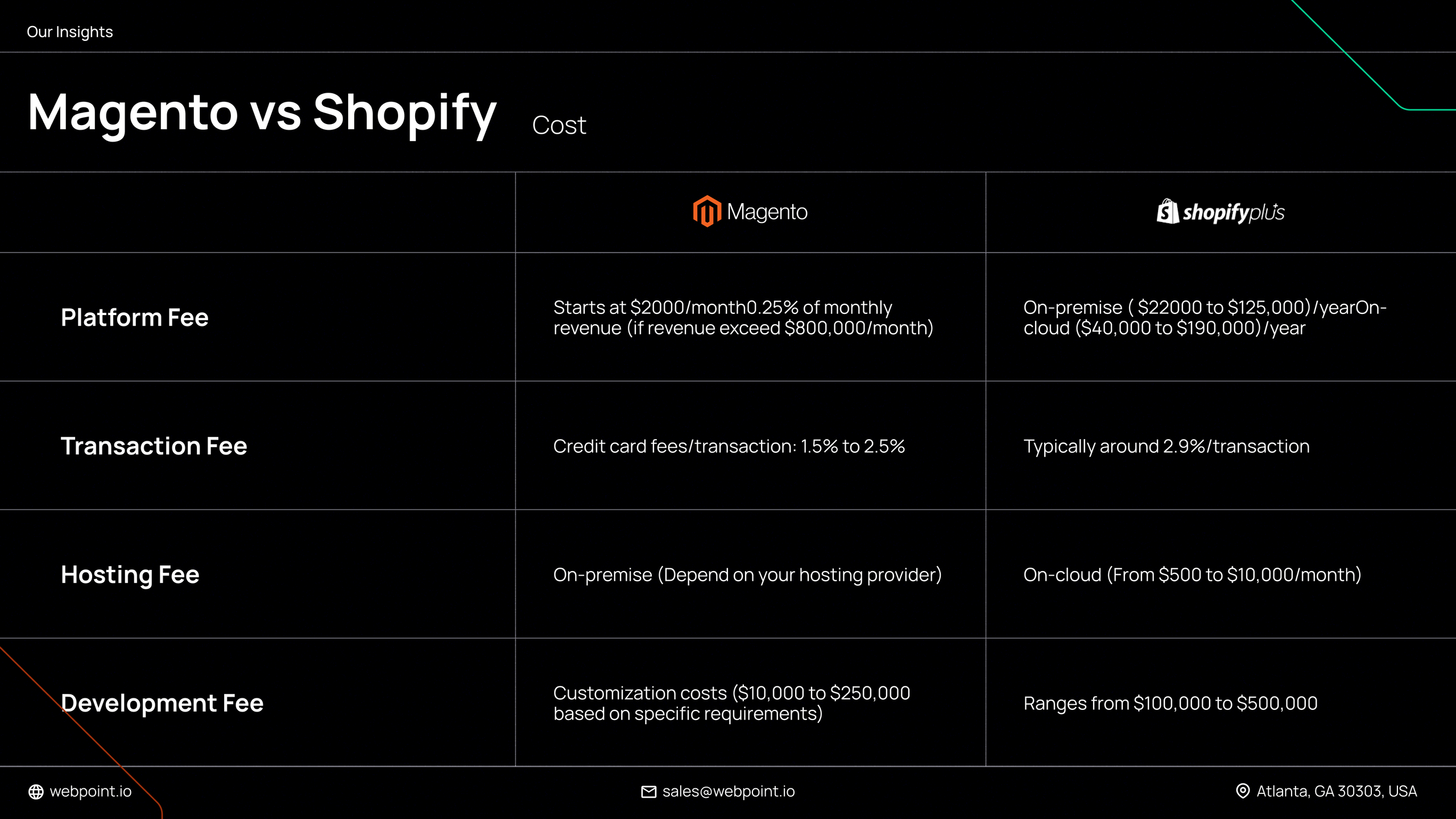
Shopify Plus Pricing
Shopify Plus designed its pricing plans to accommodate businesses with varying sizes. Let's break down the key components:
Platform Fee
Shopify Plus starts with a platform fee of $2,000 per month.
But here's an interesting twist. Once your monthly sales exceed $800,000, this fee transforms in a revenue-based model.
You'll pay 0.25% of your monthly revenue, but the payment is at most $40,000 per month or $480,000 per year.
Transaction Fee
Credit card processing fees on Shopify Plus can range from 1.5% to 2.5% per transaction.
If you're using Shopify Payments, you'll see a 0.15% fee waiver on third-party payment processing services.
Hosting Fee
One fantastic aspect of Shopify Plus is that the platform fee covers your hosting expenses. You won't have to shell out extra cash for hosting, maintenance, updates, or security – it's all Shopify's responsibility.
Development Fee
Shopify offers a range of built-in themes to construct your eCommerce website, with prices ranging from $0 to $180. However, the actual development costs depend on your specific needs and wants, varying from $10,000 to $250,000. It's crucial to align your requirements with your budget effectively.
Magento Commerce Pricing
On the other hand, Magento Commerce offers a different pricing structure that caters to businesses with varying needs.
Platform Fee
The fee spans from $22,000 to $125,000 per year for the on-premise version of Magento Commerce. If you opt for the on-cloud version, you're looking at costs between $40,000 and $190,000 annually.
Transaction Fee
Transaction fees on Magento Commerce depend on your chosen payment service providers and typically hover around 2.9% per transaction. However, we recommend you consult with Adobe directly for precise details.
Hosting Fee
The hosting aspect differs for the on-premise and on-cloud versions. You'll need to find your hosting provider for on-premise, and the cost will vary based on your choice. In contrast, the on-cloud version provides monthly hosting services ranging from $500 to $10,000. The price here varies according to your business scale and customization demands.
Development Fee
When building your website, Magento Commerce leans toward higher costs, especially compared to Shopify Plus. Development expenses range from $100,000 to $500,000 for more scalability and custom features.
Magento vs Shopify: Customization, Scalability & Flexibility
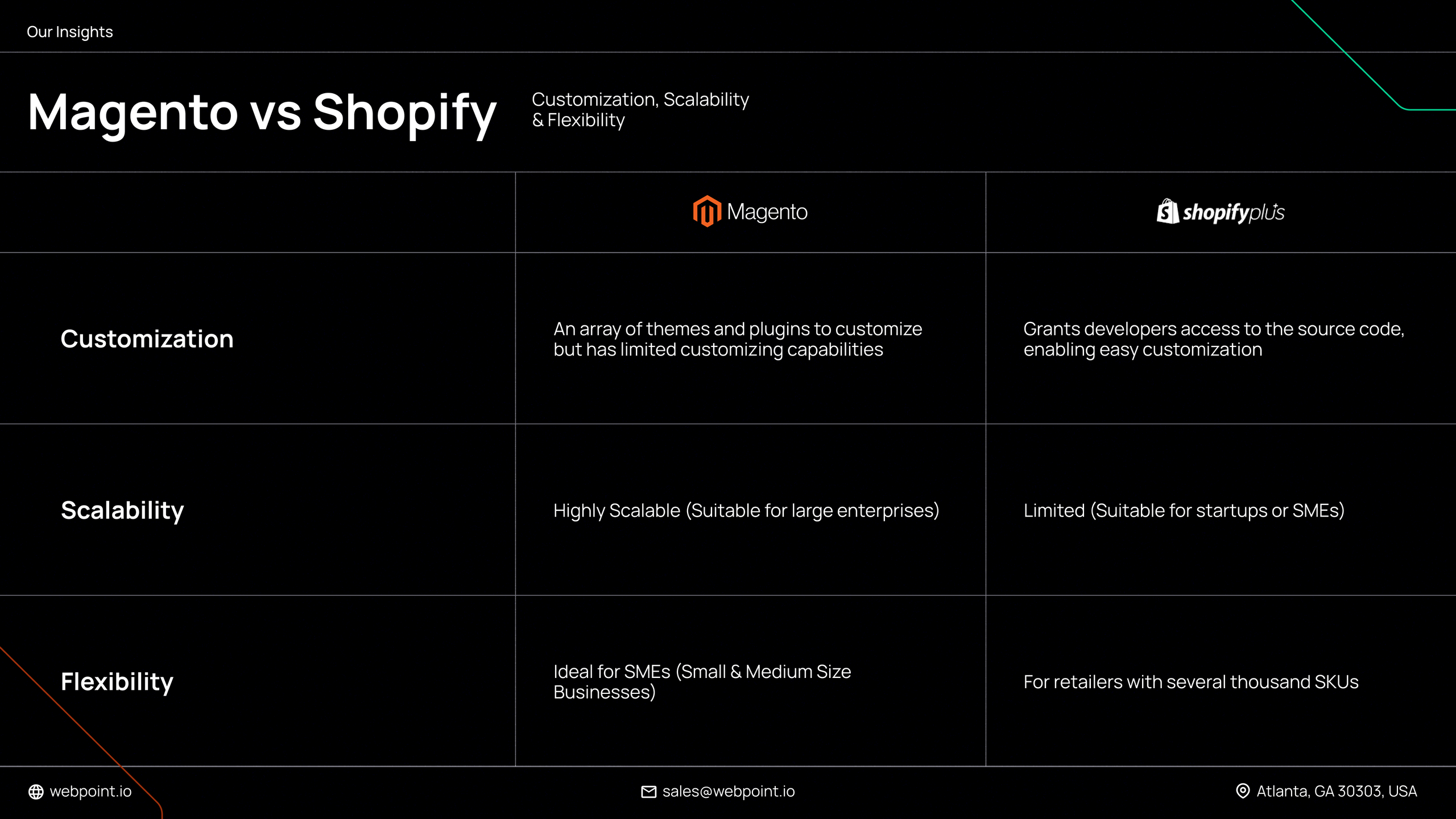
Magento vs Shopify: Customization, Scalability & Flexibility
Customization, scalability, and flexibility are necessities when choosing the right platform for your ecommerce store. Shopify Plus and Magento Commerce (formerly Magento) are two prominent players in the market, each offering unique strengths.
Customization: Magento vs Shopify
Magento Commerce
As an open-source platform, grants developers access to the source code, enabling easy customization. This open architecture allows you to create specific features and tailor integrations to match your unique needs.
If your online store requires high control over your online presence, we recommend Magento Commerce. It offers a rich canvas for creativity.
Shopify Plus:
You can tailor your online store to a considerable extent with Shopify Plus. It has an array of themes, plugins, and apps readily available to customize your store. As a Software as a Service (SaaS) platform, Shopify Plus limits your customizing capabilities.
This might be a limiting factor for businesses with advanced, highly tailored requirements.
Magento Commerce Scalable As Compared to Shopify
Both platforms are scalable, but there are differences:
Magento Commerce boasts higher scalability. This platform is ideal for businesses with large, complex product catalogs or extensive inventory management needs. It can handle significant traffic and transaction volumes, making it suitable for rapidly growing enterprises.
This platform provides advanced features to manage product catalogs, pricing, and promotions effectively.
Shopify Plus is also scalable and capable of handling increased website traffic and high sales volumes.
However, its scalability might not match the level offered by Magento Commerce, particularly for complex and extensive product catalogs.
Shopify Plus is ideal for businesses with deep technical expertise to deploy and grow their online store.
Magento Commerce Offers Flexible Solutions Than Shopify: Find Out Why
Magento Commerce offers flexibility, allowing businesses to define product types, attributes, and customization options.
This level of flexibility is beneficial for companies with specific requirements, such as customized product attributes or promotional opportunities.
Magento Commerce is an attractive choice for companies looking to provide unique customer experiences and tailor their offerings extensively.
Shopify Plus is the best option for businesses with standardized eCommerce requirements.
It handles product types, basic features, and a smaller inventory. Although Shopify Plus offers customization options, Magento Commerce comparatively outperforms it, being more flexible than its counterpart.
Businesses that require a straightforward, efficient solution may find Shopify Plus as their ultimate ecommerce solution.
The choice for customization, scalability, and flexibility ultimately depends on your business's specific needs and priorities.
Magento Commerce offers unparalleled customization and scalability options, but it requires technical expertise from your end to make it achievable.
On the flip side, Shopify Plus is renowned for its user-friendly nature. So, if you have a straightforward requirement, it might fit your online store.
Reporting & Analytics: Magento vs Shopify
When running an eCommerce business, data is your North Star.
This comparison will explore how Shopify Plus and Magento Commerce (formerly Magento Commerce) handle reporting and analytics. This will aid you in making informed decisions and charting a path to success.
Shopify Plus
Shopify Plus recognizes the power of data-driven decision-making. It provides various reporting and analytics tools to empower businesses.
Analytics Page:
Shopify caters to companies of all sizes by offering an analytics page as part of its package. This page provides
- A snapshot of your store's performance.
- Highlighting key metrics such as sales.
- Website traffic.
- Conversion rates.
Financial Reports:
Managing your finances is a breeze with Shopify's financial reports. They are handy for keeping tabs on revenue, expenses, and profit margins, allowing you to make sound financial decisions.
Product Analytics:
Gain valuable insights into your product performance. These analytics help you optimize your inventory management and sales strategies. It ensures you stock and offer the right products at the right time.
Premium Plans:
Shopify's higher-tier plans elevate your reporting game. They provide access to advanced reporting options, including Orders, Sales, and Customer reports. These reports delve deeper into customer behavior, transaction data, and other crucial aspects of your business.
Google Analytics 4 Integration:
For businesses hungry for comprehensive data, Shopify allows you to integrate with Google Analytics 4 seamlessly. This integration enables you to monitor visitor behavior, track customer interactions, and assess the effectiveness of your website's sessions.
Magento (Adobe Commerce): Analytics & Reporting
Magento Commerce stands out in reporting and analytics, offering a treasure trove of insights.
Reports Menu:
Magento's Reports Menu covers reports on a broad spectrum of your business operations. These reports span sales, product performance, customer behavior, and promotional activities. These comprehensive reports give you a holistic view of your eCommerce operations.
Business Intelligence:
Magento presents a Business Intelligence subscription for businesses on a quest for advanced insights. This subscription unlocks a personalized dashboard featuring approximately 70 reports. This dynamic and customized approach to reporting is precious.
Dynamic Reports:
Magento Commerce's Advanced Reporting dashboard is about dynamic reports. These reports come to life with easy-to-understand data visualizations. It makes it a breeze to grasp and interpret your data.
Data-Rich Dashboards:
The Advanced Reporting dashboard showcases and takes data presentation to the next level. These dashboards offer a wealth of insights across various dimensions of your eCommerce operations.
Verdict: Your Data, Your Decision
Shopify Plus, and Magento Commerce both platforms bring something unique:
Shopify Plus: Shopify Plus provides robust reporting features and insights, with premium plans offering more advanced reporting options. Small and medium-sized businesses will find Shopify's reports more than adequate for their current needs.
Magento Commerce (Magento): Magento Commerce is the choice for ecommerce stores pursuing comprehensive, tailored insights. Its Business Intelligence subscription service provides dynamic reports and data-rich dashboards. This makes it a perfect match for large enterprises with a thirst for data.
The depth of reporting and analytics insights you require determines which ecommerce platform you need.
While small businesses may find Shopify's reports fit the bill, large enterprises may savor Magento Commerce's deep reporting capabilities. It's your data, and the choice is yours.
Magento vs Shopify Plus: Community & Customer Support
When running an eCommerce business, reliable community support and assistance can make a difference.
Shopify Plus: Ease of Use and Customer Support
User Interface:
Shopify Plus boasts a clean, modern, intuitive interface.
Its navigation is straightforward, making it easy to find and access features related to products, content, finances, and marketing. Shopify Plus is a beginner-friendly platform that offers a personalized setup guide. This allows newcomers to manage and grow their online store with ease.
Customer Support:
Shopify's customer support team is at your service 24/7 through email and chat.
Additionally, the Shopify Help Center provides extensive documentation, video tutorials, and helpful guides to assist you in navigating the platform.
Shopify Community lets you connect with fellow merchants, discuss issues, or seek advice. It caters to businesses with various customer support options, ensuring that assistance is readily available.
This includes 24/7 customer support, a comprehensive help center, and an active community forum.
Shopify Plus provides dedicated account managers to take the customer support experience further. These professionals offer tailored support, helping businesses with technical issues, site optimization, and various concerns.
This personalized approach ensures that companies receive timely and effective solutions.
Direct Merchant Success Manager:
Accessible 24/7, Shopify Plus offers users a direct merchant success manager to provide support.
This responsive feature promptly addresses various issues, including technical queries, marketing, and conversion rate optimization.
Cost-Free Technical Support:
Users can use cost-free technical support, eliminating the need for additional development expenses.
Magento Commerce: Ease of Use and Customer Support
User Interface:
Like Shopify Plus, Magento Commerce offers a neat, organized, intuitive admin dashboard. You can efficiently manage products, perform administrative tasks, and handle sales. However, users might need to invest time and effort into learning the platform's workflows and configuration settings.
Customer Support:
Magento Commerce provides the option to open support tickets. You can view the status of existing tickets and contact the support team for assistance.
Magento Commerce
The Magento Commerce Help Center offers comprehensive user guides, support tools, forums, and developer documentation to aid users. Additionally, Magento Commerce provides dedicated customer support channels through phone, email, and chat. Their comprehensive knowledge base and online community forums serve as valuable resources for users.
Businesses can purchase support packages with additional training, implementation, and site performance analysis services.
Strong Community:
Magento Commerce has cultivated a vast online community as an open-source platform.
Magento Commerce boasts a robust community of developers and partners who can provide technical assistance and customization support.
Hundreds of thousands of developers worldwide actively share their knowledge and experience. If you encounter a problem, there's likely a solution in these communities.
Magento Commerce DevDocs:
This resource offers a wealth of valuable guides and documentation for those seeking answers and assistance.
Magento Enterprise Development Companies:
Magento Enterprise Development Company provides comprehensive assistance. Professional support and knowledge-sharing distinguishes Magento Commerce (Magento Commerce).
Our verdict.
Shopify Plus provides dedicated support and cost-free technical assistance, making it accessible and user-friendly.
On the other hand, Magento Commerce boasts a robust online community and extensive documentation. You can also collaborate with development companies, making it a solid choice for those seeking comprehensive support.
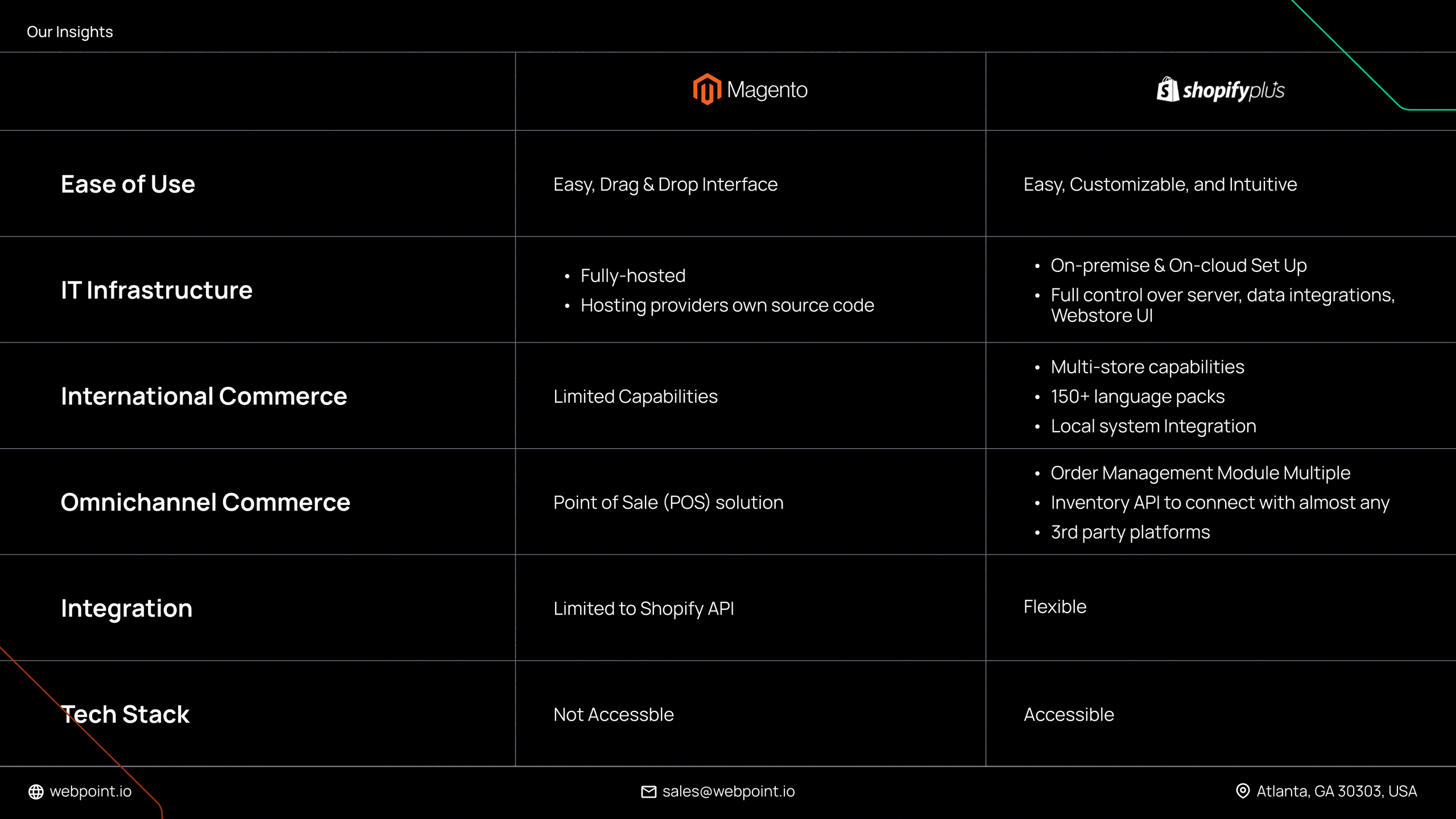
Magneot vs Shopify: Multi-store Management & Omni-channel Capabilities
The ability to effectively manage multiple online stores and provide customers with a seamless omnichannel experience is essential, especially today.
Shopify Plus and Magento Commerce are prominent platforms that can provide full-fledged ecommerce solutions to large enterprises. Still, they differ in how they handle multi-store management and omnichannel capabilities.
Let's dive into the critical distinctions between these two e-commerce giants.
Shopify Plus: Multi-store Management
Shopify Plus offers an efficient multi-store management solution. It allows businesses to create up to 9 additional storefronts alongside their main store in various locations.
The beauty of this system lies in its centralized dashboard. You can oversee analytics, employee accounts, user permissions, and automation tools from the dashboard.
It's a streamlined approach that ensures a cohesive management experience. However, each additional store is subject to charges based on its Gross Merchandise Volume (GMV).
Shopify Plus allows a maximum of 20 locations for tracking inventory and order fulfillment.
Magento Commerce: Multi-store Management
In contrast, Magento Commerce provides a limitless multi-store management capability.
You can create multiple stores, all accessible from a single admin panel. This flexibility especially appeals to multinational corporations and global B2B and B2C retailers. With Magento Commerce, you can synchronize inventory and share product catalogs among your stores.
Moreover, you can implement changes at different levels to tailor product attributes locally or globally.
Store owners with an expansive inventory can immensely benefit from Magento Commerce. Its comprehensive multi-store management feature can handle multiple brands or businesses at one place.
Our Verdict.
Shopify Plus simplifies management with a capped number of additional stores. Magento Commerce excels with its limitless scalability and shared catalogs.
Magento Commerce: Omnichannel Capabilities
Magento Commerce excels in providing robust omnichannel capabilities.
It offers two primary approaches to implementing omnichannel strategies. First, order management allows you to seamlessly handle orders, shipping, returns, and inventory across various sales channels. Second, Magento Commerce offers a range of third-party extensions and integrations designed to enhance your omnichannel operations.
These capabilities are vital for both brick-and-mortar stores and online marketplaces.
Shopify Plus: Omnichannel Capabilities
Shopify Plus also excels in omnichannel support, with a standout feature, the Point of Sale (POS) system.
The Shopify POS system seamlessly integrates sales across various channels, bridging the gap between online and offline sales. It encompasses multiple hardware, including card readers, receipt printers, cash drawers, and all-in-one point-of-sale systems.
Moreover, it simplifies processes like refunds and exchanges, allowing businesses to operate fluidly across multiple channels.
Our verdict.
Magento Commerce and Shopify Plus provide powerful omnichannel capabilities to cater to businesses looking to create a unified shopping experience across various sales channels.
Shopify Plus's impressive POS system complements Magento Commerce's order management and third-party extensions.
Both platforms offer omnichannel capabilities tailored to the needs of large-scale enterprises.
Magento vs Shopify: Which Platform Is Right for You?
Choosing the ecommerce platform for your online store directly impacts your online operations.
Shopify Plus and Magento Commerce (formerly Magento Commerce) are two heavyweights in the e-commerce arena. Each platform has unique strengths and capabilities. Here, we will help you decide between Shopify Plus and Magento Commerce.
Your Choice.
The decision between Shopify Plus and Magento Commerce ultimately boils down to your ecommerce needs and business goals. Here's a quick breakdown to help you navigate your choice:
Magento (Adobe Commerce):
Opt for Magento Commerce if you require a highly customizable and scalable platform.
It's ideal for large enterprises and businesses with a complex catalog, extensive integrations, and plans for international expansion.
Magento Commerce stands out for its flexibility, advanced capabilities, and robust built-in features.
Shopify Plus:
Choose Shopify Plus if your e-commerce requirements are straightforward and you aim for simplicity.
Ideal for retail businesses and straightforward B2B operations, it's an excellent fit. If your budget is tight, Shopify Plus is a go-to platform for your online store. Opt for Shopify Plus for a user-friendly platform without the need for extensive tech skills.
Shopify Plus does meet your immediate needs.
Webpoint Solutions is an ecommerce development agency specializing in developing ecommerce stores for small to large enterprises. We help you harness the full potential of either platform, ensuring you make the most of its powerful features. Contact us to have a tailored discussion about which platform aligns best with your e-commerce business.
Which One to Choose: Magento Commerce or Shopify Plus?
You know the critical distinctions between Magento Commerce and Shopify Plus. Now we will help you make this pivotal decision of your platform choice.
Shopify Plus:
With low upfront and operational costs, it's an excellent all-in-one package. It suits small to medium-sized businesses and startups. It offers a merchant-first approach with minimal technical and maintenance overhead.
Magento Commerce (Magento Commerce):
Magento Commerce provides a vast array of services and features but may require the employment of Magento developers.
The trade-off is unlimited customization capabilities, scalability, and extensibility. The substantial investment to kickstart Magento Commerce might be significant. Still, you can begin with the free Magento Open Source platform and transition to Magento Commerce when right.
Reach out to us for a detailed consultation on your online store.
We're excited to share our expertise and help you make an informed decision. Let us assist you in not only choosing the right ecommerce platform for your business but also developing it.
Which one might be the best ecommerce solution for your online store?
To determine the most suitable platform for your business, consider the following factors:
- Business size and scale
- Customization and complexity needs
- Technical resources
- Growth plans
- International expansion plans
These factors will play an immense role in selecting Magento vs Shopify Plus.
Consider your business's unique requirements, budget, and growth objectives. With this information, you can make a well-informed decision that propels your online store to success.
The Bottom Line
When comparing Magento vs Shopify Plus, there is no clear winner.
Your business needs and available resources should drive your choice. Magento Commerce offers superior customization and scalability, making it a go-to choice for those valuing advanced features. Shopify Plus provides a hassle-free and intuitive solution for a simplified e-commerce experience.
Keep in mind that both platforms come with their own learning curves.
Magento Commerce demands more technical knowledge, while Shopify Plus may require time to explore its various apps and features. Make your decision wisely, and both platforms will empower your business to thrive in the ever-evolving world of e-commerce.
Remember, your choice of an e-commerce platform is just one piece of the puzzle.
Leveraging the right technology and integrations can take your business to the next level. Shopify Plus and Magento Commerce offer robust functionalities and unique features to help companies achieve their growth goals. Magento Commerce excels with its powerful B2B capabilities, while Shopify Plus provides an intuitive interface and flexibility for customization.
Evaluate your requirements carefully and embark on your e-commerce journey with the platform that best suits your business.
Frequently Asked Questions

